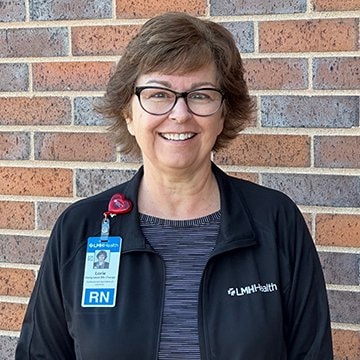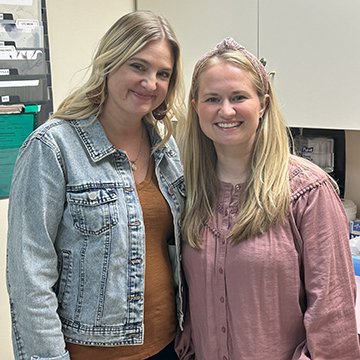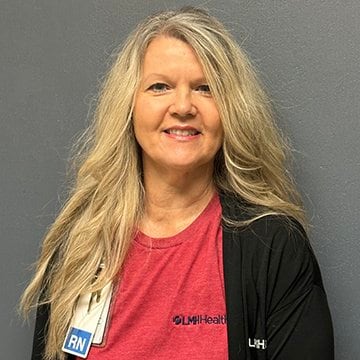Nurse navigators guide patients through healthcare
When you receive a diagnosis of heart failure or cancer, your world stops on a dime. The myriad of appointments, labs and tests can be overwhelming. At LMH Health, you’ve got someone in your corner dedicated to guide your journey – a nurse navigator.
“We identified a gap for patients, particularly those who needed to coordinate care between different providers,” said Megan Pedersen, administrative director for LMH Health specialty clinics. “With a nurse navigator, the patient has a dedicated contact who will guide them through everything they need.”
What does a nurse navigator do?
A nurse navigator is your guide, helping you navigate the complicated path that lies ahead. They connect you to resources and information to help you make informed decisions throughout your treatment process. Their job includes:
- Scheduling appointments and coordinating care between multiple doctors, clinics and specialties
- Providing education to patients about their condition, treatment and potential side effects
- Answering questions throughout all stages of treatment

Lorie Sawyer
Lorie Sawyer has been a nurse at Cardiovascular Specialists of Lawrence since 2012. She began her role as a nurse navigator when it was introduced in the clinic about a year ago. Navigators are available to any cardiology patients who need to undergo a procedure.
“If you’re having a heart cath or getting a pacemaker or LINQ implant, I schedule those procedures, provide you education about the procedure, what to expect and what you need to do,” she said. “If we refer you to another location, I follow up and ensure that you get back to us for care. Whether it’s long or short, I’m with you throughout the journey.”
Nurse navigators aren’t unique to LMH Health. Many hospitals and health systems around the country employ nurses in these roles every day. It’s even a requirement to receive certain milestones, such as accreditation from the Commission on Cancer.
“We recognize the level of support that nurse navigators provide and that having this role improves patient outcomes,” Pedersen said. “We work with about 600 new cancer patients each year. Our navigators meet with each and every one of them.”
Cindy Crocker has been a nurse at the LMH Health Cancer Center for more than a decade. She knows that being a dedicated point of contact during such an uncertain time is a lifeline for her patients.
“Everything can become a blur after a cancer diagnosis. You get a lot of information in the beginning and sometimes additional tests, procedures or referrals to other specialists need to be done before starting treatment. The process can be overwhelming,” she explained. “I’m there from the beginning, meeting each patient at their first appointment.
“I’ll provide education and answer your questions, set up your appointments, make referrals, identify barriers and be there in the background when you need me. I’m here to help you through the journey from start to finish.”
Being there in times of joy

Megan Askins and Erin Norton
Nurse navigators aren’t only available for patients who have life-threatening illnesses, they’re also guides through one of the most joyous times of life – during pregnancy. Erin Norton and Megan Askins begin working with patients at Lawrence OB-GYN Specialists from their first appointment confirming pregnancy.
“We meet with patients at least three times during their pregnancy – at confirmation, 20 weeks and again at 34 weeks,” Norton explained. “We’re the person they can call when they have questions. We call them with lab results, facilitate tours of the birthing center, and meet with them one-on-one.”
Maternity navigators were in place at LMH Health prior to the advent of COVID-19. The necessity of that role during the pandemic was clear to Norton. While she’d worked as a nurse with the health system for a number of years, including roles in the emergency department and care coordination, she wasn’t sure what to expect during her own pregnancy.
“I delivered my son at LMH in the middle of COVID, so I didn’t know what was normal and what wasn’t,” Norton said. “It’s important to have a navigator so that patients feel supported and have a go-to person that they can talk to and ask questions.”
Each of the maternity navigators works with specific doctors or midwives and follows their patients throughout pregnancy. Askins explained that it provides an opportunity to build a repertoire and trust because of the regular contact. It’s important to her to be an extra resource for patients in a time that can be both exciting and scary.
“I want you to feel confident and supported so that you can enjoy your pregnancy,” she said. “I talk with my patients regularly and get to know more about them.”
Developing a relationship with her patients has proven to be invaluable for Askins. In one case, a patient called and seemed extremely anxious about her symptoms, which wasn’t typical for them. That change in attitude was enough for Askins to act.
“My patient wasn’t one to complain, and I was concerned enough to get her in for an appointment that day,” she said. “We had to emergently send her to the metro to have a procedure. Had we not been that close, I might have thought that we could wait a little longer to get her in, but I knew that something wasn’t right. It’s just one example of how building that repertoire ahead of time can lead to a good outcome.”
Beyond the bedside

Cindy Crocker
For patients at the Cancer Center, the journey with a nurse navigator doesn’t end once you’re no longer living with the disease. LMH Health’s cancer survivorship program delivers support and care after treatment ends.
The nurse navigator position is funded through generous gifts to the LMH Health Foundation’s survivorship program. The navigator will work with your oncologist to provide you with an end-of-treatment care summary, including information about your diagnosis, treatment, possible side effects and long-term risks and what you can expect going forward.
“We’ll help you navigate life after your cancer treatment,” Crocker said. “We help to make sure you’re monitored properly and have the right follow-up care. And we connect you with resources to help emotionally, financially, and socially, if needed.”
Whether you’re facing an uncertain diagnosis or awaiting the arrival of a new family member, you’re not alone when you have a nurse navigator by your side.
“It can be scary and uncertain, but you have a steady person here looking out for you,” Crocker shared. “We’re here to help educate and support you. You don’t have to go through this journey on your own.”